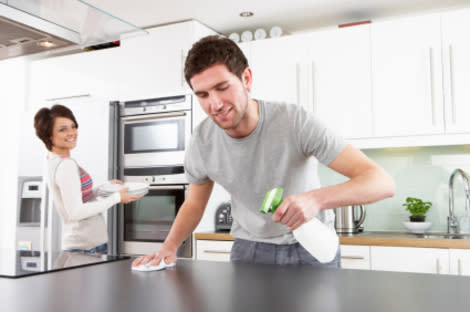Easy Ways to Keep Your Kitechn Toxic Free

A spot-free kitchen is the characteristic of most houses. Surprising it may be, but some of the daily products used compromise the kitchen's hygiene and put your life at risk. Materials like Teflon, lead, phthalates, BPA and melamine are present in almost every kitchenware, even though health issues have sprung up because of them, time and again. Certain alternatives can help you minimize the risks and effects of these products.
Read-Top Hidden Dangers in Your Home
Plastic Containers
Plastic contains BPA, so try your best not to store food items in plastic containers. BPA is easily transferred to food. Low doses of BPA have been linked with obesity, impaired immune function, diabetes and even cancer. Some manufacturers claim their products are BPA free, but even these contain other harmful chemicals.
If you cannot avoid plastic, then choose a PVC free plastic of #2, #4 or #5. Only keep non fatty and non greasy foods in these containers. Don't use them in a microwave because heat will aid the transference of dangerous chemicals into the food. If the plastic is scratched or worn off, then throw it away.
Read-Top Tips to Keep Your Kitchen Clean
Melamine Dishes
Melamine dishes are manufactured from melamine and formaldehyde. Formaldehyde is a human carcinogen and transfers into food easily.
Teflon Coatings
Teflon is made from perfluorooctanoic acid (PFOA) which is also a human carcinogen. When Teflon is subjected to high temperatures, poisonous fumes are formed which kill birds and harm human beings. These chemicals are also released when Teflon containing products are scratched or chipped off.
Read-Affordable Ways to Re-Paint Your Kitchen
Aluminum Cookware
Aluminum is a highly reactive substance, and migrates into food if it is cooked in these pots. Aluminum causes brain disorders and behavioral abnormalities. Anodized aluminum is a better choice because its layer is more durable and does not diffuse into foods. This effect is reduced with time so it is not safe for long term use.
Read-Uses of Baking Soda in Your Home
Glass and Steel Products
Products made from glass, stainless steel, ceramic and food-grade silicones are the safest to use in kitchens. All of these contain chemicals which cannot leak into food. The best of these are glass and ceramic dishware. If you have concerns with the fragility of glass, then use a food grade silicone, 304-grade stainless steel or a wooden container to store your food items.
Cleaning Products
The products which you use to clean and wash your cutlery should also not possess any harm. Do not use any items containing bleach, ammonia, synthetic fragrances or dyes.
Read-Simple Kitchen Cleaning Tips to Keep Everything Smooth and Stain-Free
Filter
Install a filter in your kitchen, and use it to purify water before you drink it or add it into your food. Make sure the filter removes chlorine, heavy metals and VOC's. Try to use the same water for your cooking.
Read more at Betterhealthblog:
· Ways Get Your Husband to Help out Around the House
· Save Money in the Kitchen - 3 Tips to Save Money at Home
· 7 Steps to Organize a Kitchen Effectively
· Pick Your Most Energy Efficient Cookers-Gas Pizza Ovens
